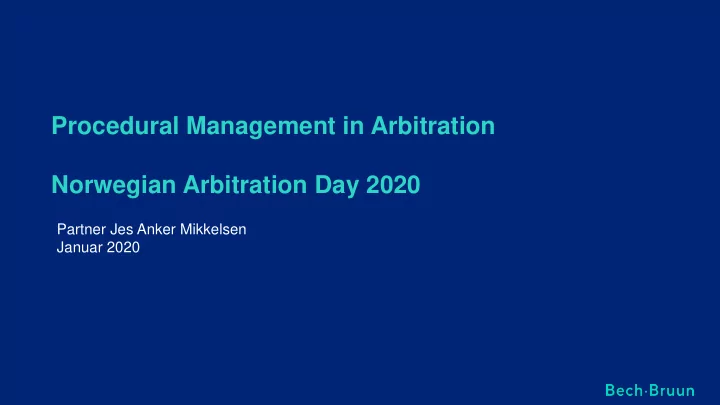

Procedural Management in Arbitration Norwegian Arbitration Day 2020 Partner Jes Anker Mikkelsen Januar 2020
2 Principles for efficient procedural management of international arbitration - Firm proactive approach - Clear rules - Efficiency - Clear timetable - Solicitation of parties in governing rules, time, etc. - Suggestions for best practices - In P.O. - Timetable - Preclusion of pleadings, etc. - Hearings Can we disagree?
3 Principles for efficient procedural management of international arbitration - Why are these principles and recommendations not always followed by parties and arbitrators? - Why are the parties/counsels challenging the tribunals by not adhering to these principles and a smooth proces? - Has that become worse?
4 The arbitrators often see: - Extensive correspondence about appointment of a ” clean ”, non -biased arbitrator and chairman - Discussions about the P.O. - Difficulties in agreeing on timetable - Untimely filings of submissions and evidence - Postponements of hearing - Procedural objections, obstructions - Reservations for setting aside proceedings - Parties not holding back on threatening the arbitrators
5 Found during research: “Fifteen Ways to Annoy in Arbitral Proceedings - do not pay any advances, except those for the counterclaim - do not offer any help in appointing the tribunal - choose an obstructing arbitrator and challenge the other arbitrators for whatsoever insignificant reasons; if your challenge is unsuccessful, try to bribe the chairman - change lawyers in mid-stream or do not pay your lawyers, so that they refuse to do work - frustrate the service of documents; act as if you were insolvent/dissolved/in coma/dead - do not sign the Terms of Reference - submit an unsolicited 20-page telefax with 5 procedural motions every Friday - do not adhere to any procedural orders - ask for extensions on a regular basis - file your submissions late - refuse to produce documents - present documents/witnesses at the very last moment - try to postpone hearings (if necessary, by injunctions); do not appear for a hearing; walk out from a hearing - sue the arbitrators/arbitral institutions”
The result is frustration amongst arbitrators who wish to be 6 efficient and are keen on parties being treated equally and given the right to present their case - Fear of having their awards - being challenged or - set aside or - refused recognition under the N.Y. Convention - Reluctancy in making decisions - Increased time and cost consumption - Slow proces
But are national courts increasingly interfering with tribunals’ 7 procedural decisions? - No statistics or studies show that - No judgments - Is the fear exaggerated? - Have the arbitrators become due proces paranoid?
8 The risk of criticism is sufficient for the arbitrators - Conflict with one of the parties - Might incur further work and costs - The defending party will be incurring further costs - Embarrasing in the arbitration environment - Fewer appointments
9 The way to effectively balance fairness against efficiency - Adopt the best practices - Act boldly without excessively worrying about due proces - Be cautious, try to avoid challenges - Be robust and proactive - Make sure that the losing party has no reasons at all to be dissatisfied with the procedural rules
10 Jes Anker Mikkelsen Partner T +45 72 27 35 86 M +45 25 26 35 86 E jam@bechbruun.com
Recommend
More recommend